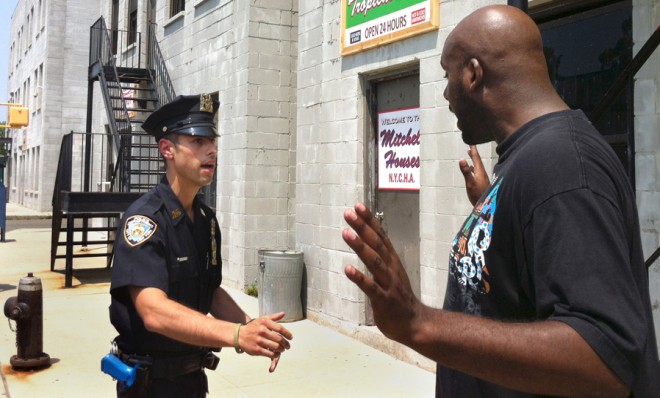Is this the end of stop-and-frisk?
A federal judge calls the New York Police Department's crime-fighting tactics "racially discriminatory"

A free daily email with the biggest news stories of the day – and the best features from TheWeek.com
You are now subscribed
Your newsletter sign-up was successful
On Monday, a federal judge ruled that the New York Police Department's stop-and-frisk tactics violated the constitutional rights of minorities.
"The city's highest officials have turned a blind eye to the evidence that officers are conducting stops in a racially discriminatory manner," the Judge Shira A. Scheindlin wrote in a scathing opinion. "In their zeal to defend a policy that they believe to be effective, they have willfully ignored overwhelming proof that the policy of targeting 'the right people' is racially discriminatory."
The ruling is a major blow to the tough-on-crime legacy of Mayor Michael Bloomberg, who has vigorously defended stop-and-frisk for helping bring down levels of violence in New York. Under stop-and-frisk, police can question anyone suspected of being involved in criminal behavior and frisk them for weapons, a policy that civil rights groups say encourages racial profiling and violates the Fourth Amendment's protections against unreasonable searches and seizures.
The Week
Escape your echo chamber. Get the facts behind the news, plus analysis from multiple perspectives.

Sign up for The Week's Free Newsletters
From our morning news briefing to a weekly Good News Newsletter, get the best of The Week delivered directly to your inbox.
From our morning news briefing to a weekly Good News Newsletter, get the best of The Week delivered directly to your inbox.
Scheindlin concurred, claiming that because 88 percent of stops resulted in no ticket or arrest, there probably wasn't a good enough reason to make the stops in the first place. She said a federal monitor should be appointed to oversee the program.
Bloomberg and New York City Police Commissioner Ray Kelly struck back hard at a press conference after the ruling.
Kelly called the charges of racial discrimination "recklessly untrue." Bloomberg announced that the city would appeal Scheindlin's decision.
"Nowhere in her 195-page decision does she mention the stark cut in crimes and the lives that were saved," Bloomberg said. He said that while people have a right to walk down the street without being stopped, "people also have a right to walk down the street without being afraid of being killed or mugged."
A free daily email with the biggest news stories of the day – and the best features from TheWeek.com
Bloomberg claimed that "the possibility of being stopped acts as a vital deterrent" to carrying a gun. He added, "If this decision were to stand, it would make our city and the whole country a more dangerous place."
The NYCLU — which has complained that 90 percent of all those stopped over the last decade have been black or Latino — lauded the judge's decision:
Scheindlin was presiding over a class-action lawsuit that included testimony from the NYPD and 11 people who claim they were wrongfully stopped and searched because of their race.
What does the judge's ruling mean for stop-and-frisk?
If the city's appeal is rejected, Peter L. Zimroth, an outside lawyer appointed by Scheindlin, will monitor how the department complies with the Constitution. In addition to finding that stop-and-frisk violated the Fourth Amendment, Scheindlin said the policy trammeled on the Fourteenth Amendment's equal protection clause.
Stop-and-frisk can't be banned outright, however, because the Supreme Court previously found it to be permissible under certain conditions.
That's why Scheindlin has ordered several possible remedies against discriminatory stops, including body cameras for officers across at least five precincts and regular community meetings at which citizens can discuss stop-and-frisk practices with police.
The judge wrote that she hopes the new measures will cut down on what she calls "a demeaning and humiliating experience," arguing, "No one should live in fear of being stopped whenever he leaves his home to go about the activities of daily life."
Stop-and-frisk has emerged as one of the central debates of the mayor's race in New York, with proposals ranging from root-and-branch reform to establishing an independent inspector general to oversee the program and reduce the number of stops.
Keith Wagstaff is a staff writer at TheWeek.com covering politics and current events. He has previously written for such publications as TIME, Details, VICE, and the Village Voice.
-
 The mystery of flight MH370
The mystery of flight MH370The Explainer In 2014, the passenger plane vanished without trace. Twelve years on, a new operation is under way to find the wreckage of the doomed airliner
-
 5 royally funny cartoons about the former prince Andrew’s arrest
5 royally funny cartoons about the former prince Andrew’s arrestCartoons Artists take on falling from grace, kingly manners, and more
-
 The identical twins derailing a French murder trial
The identical twins derailing a French murder trialUnder The Radar Police are unable to tell which suspect’s DNA is on the weapon